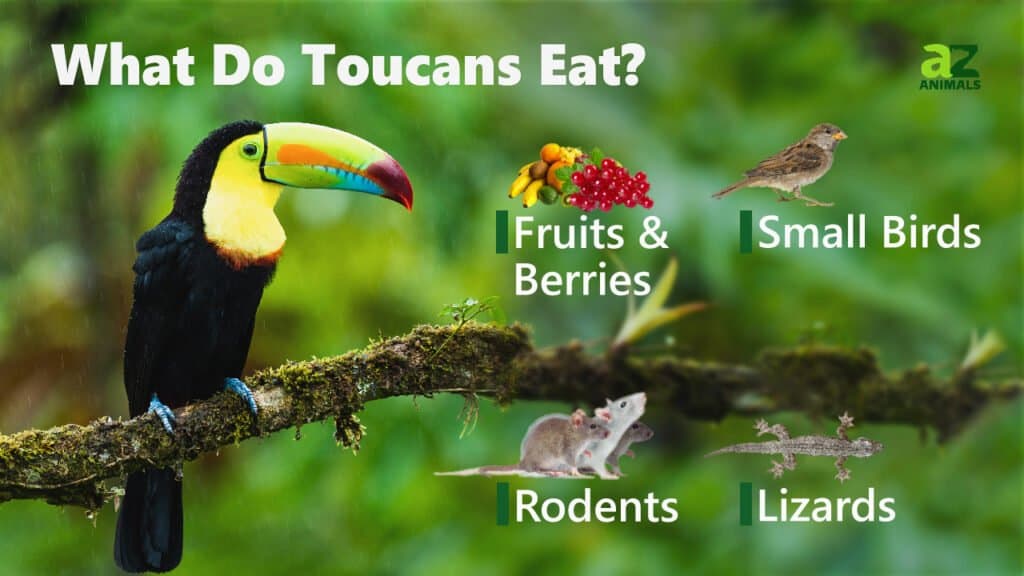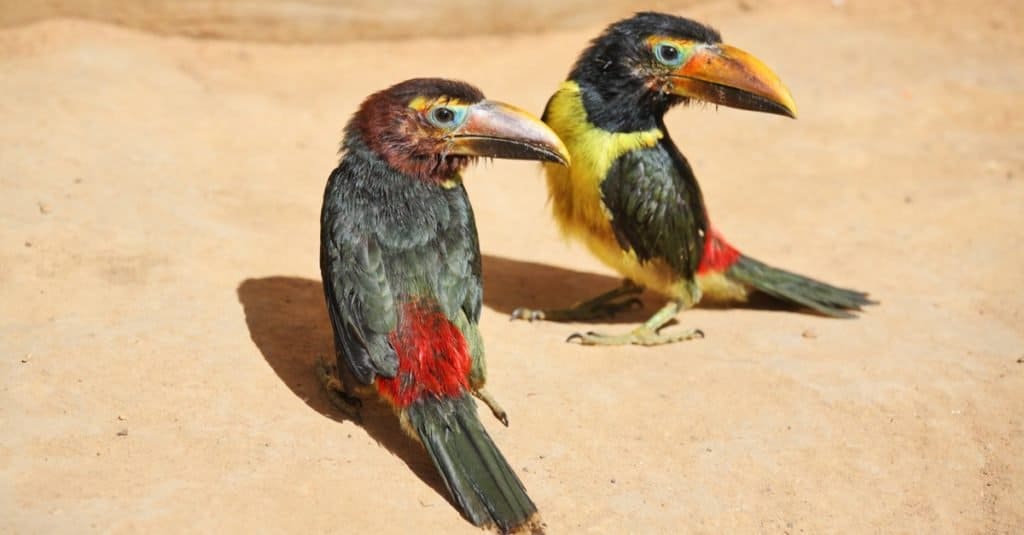Toucans are well-known for their huge, brightly colored bills. These birds can be found in forests throughout Central and South America. Toucans can grow to be 25 inches long, with half of that being the size of their beak. Toucans are easily one of the most recognizable birds on the planet!
Curious to find out what exactly toucans eat? Toucans are omnivorous. They eat a variety of foods including fruits, berries, lizards, rodents, small birds, and insects. Do you want to know how their incredible beaks aid in their hunt for food? All that will be answered and more as we begin our deep dive into everything you need to know about the toucan’s diet.
What Do Toucans Eat?

So, what does a toucan eat? Toucans eat a diet that consists of berries, fruits, and insects. They are predominately omnivores. In the wild, certain toucans may consume lizards, rodents, and even small birds.
Here is a list of the many fruits that a toucan will consume:
- Papayas
- Strawberries
- Blueberries
- Dragon Fruit
- Watermelon
- Figs
When it comes to rodents, these are the most popular ones that a toucan will eat:
As far as insects go, these are some of the toucan’s absolute favorites:
- Crickets
- Termites
- Cicadas
- Mealworms
- Caterpillars
It is critical that Toucans do not ingest specific seeds within their fruit since they have difficulty digesting them.
How Much Do Toucans Need To Eat?
Wild toucans can consume up to six little portions of food every day, depending on what they can find while looking for food.
Toucans kept in captivity are often fed two large meals every day. Because a toucan’s diet consists primarily of fruits, these birds acquire all of their water from them. That is why a toucan’s diet and how much they consume are so vital to their general health and well-being.
What Do Toucan Babies Eat?

Baby toucans eat fruits, mostly berries provided by their parents.
©Vladimir Melnik/Shutterstock.com
Fledglings are toucan newborns. They are fed soft berries and other foods. Female toucans may lay up to four eggs, and both the male and female will take turns incubating the eggs until the fledglings are ready to hatch. Fledglings are not born with the huge beaks that we associate with toucans, but rather develop into them as they mature.
Toucans practice biparental care, which means that both parents look after and feed their young until they are old enough to leave the nest. Toucan parents eat and then regurgitate their food into the mouths of their fledglings so that they may eat it. This continues until the young are ready to eat tougher meals on their own.
What Eats The Toucan: Toucan Predators
You might imagine that the toucan’s large beak would deter any predators wanting to make this bird their next meal, but you’d be mistaken! Toucans are preyed upon by a number of predators, some of which are listed below:
Deforestation and hunting play a huge part in the threat to toucans. Humans will go to great lengths to capture these gorgeous birds in order to sell their feathers and flesh. Since toucans aren’t particularly good fliers, they’re easy to capture.
Toucans are losing their habitats within trees and high canopies as a result of deforestation. They are also being injured and killed by falling trees. The spread of disease from people to toucans also has an impact on the population.
Many individuals seek out toucans to sell as pets, knowing that the exotic bird may go for a high price. What most people don’t understand is that toucans are not designed to be pets and can die quickly if not properly cared for.
Toucans have been observed to live in the wild for up to 20 years. They have a reduced life span in captivity, only living to the age of 18 years. Because most pet toucans are not adequately fed, they can develop an iron-storage illness. Most Toucan pet owners feed this exotic bird a high-iron diet without realizing it, despite the fact that Toucans predominantly consume fruits, which are low-iron.
How Do Toucans Eat with their Beaks?
The toucans’ large beaks are key to how this animal forages in the wild. They utilize the length of their beaks to reach into holes in trees. They also use it to stretch out to collect fruits that are hanging from trees.
When you see a toucan eating, you may notice that if they have a piece of food that is too large for them to eat, they will throw it up into the air multiple times. This will help crush it down until it can easily glide down their throats.
Toucans have extremely long tongues. Toucans do not have teeth, so they use their tongue to assist them in pushing the food to the back of their throat. This is so the food doesn’t get trapped on the roof of their beak.
The photo featured at the top of this post is © iStock.com/Ondrej Prosicky
Thank you for reading! Have some feedback for us? Contact the AZ Animals editorial team.






